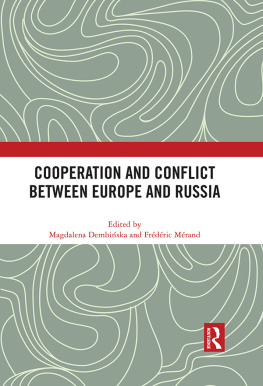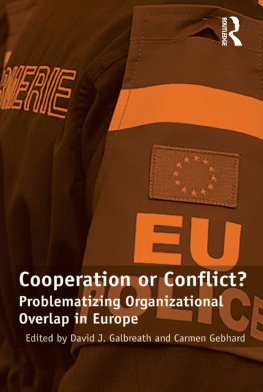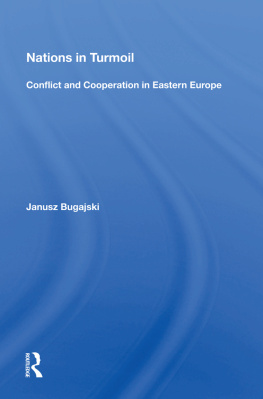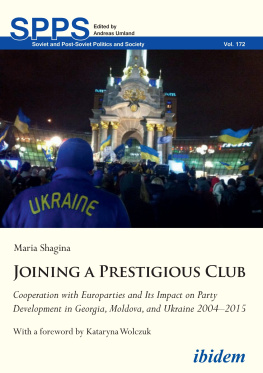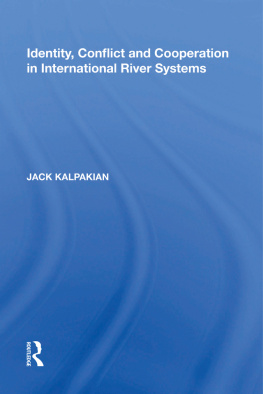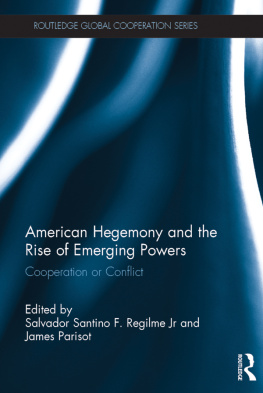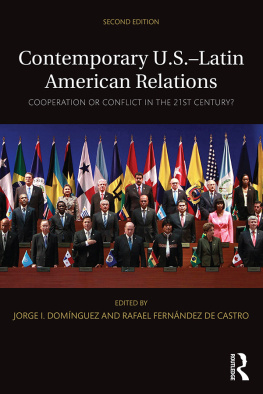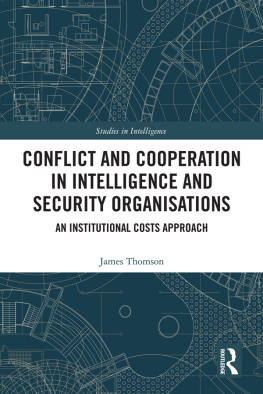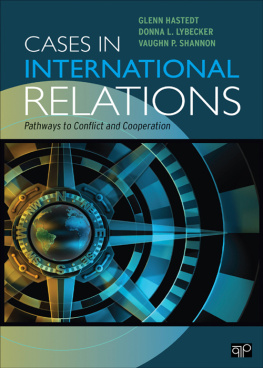Cooperation and Conflict between Europe and Russia
When thinking about relations between Europe and Russia, International Relations scholars focus on why conflict has replaced cooperation. The geostrategic debate excludes the possible coexistence of cooperation and conflict. This edited volume argues that, although the standard narrative remains compelling, local patterns of cooperation and conflict are partly autonomous from the geostrategic level. Tracking the evolution of conflict and cooperation patterns in three zones of contact (Estonia, Kaliningrad, and Moldova) between 1991 and 2016, the first chapter elaborates a theoretical proposition distinguishing fluid, rigid, and disputed symbolic boundaries, which have different impacts on the ground. The subsequent chapters address distinct dimensions of Euro-Russian relations, paying attention to local reality in Estonia, Moldova, Ukraine, or Kaliningrad, different sectors from energy to peoples movement, and across institutional contexts such as the EU and NATO. They confirm that the standard narrative holds in most cases, but also that Euro-Russian relations vary in crucial ways according to the interests and representations of actors immersed in specific geopolitical fields.
Despite a deterioration of geostrategic relations between Europe and Russia since the end of the Soviet Union, Cooperation and Conflict between Europe and Russia explores the intriguing coexistence of conflict and cooperation at the local level and across sectors and institutions.
The chapters in this book were originally published as a special issue of the journal East European Politics.
Magdalena Dembiska is Professor of Political Science and Academic Director of CRIUM, the Centre for International Studies at Universit de Montral.
Frdric Mrand is Professor of Political Science and Scientific Director of CRIUM, the Centre for International Studies at Universit de Montral.
Cooperation and Conflict between Europe and Russia
Edited by
Magdalena Dembiska and Frdric Mrand
First published 2022
by Routledge
2 Park Square, Milton Park, Abingdon, Oxon OX14 4RN
and by Routledge
605 Third Avenue, New York, NY 10158
Routledge is an imprint of the Taylor & Francis Group, an informa business
2022 Taylor & Francis
All rights reserved. No part of this book may be reprinted or reproduced or utilised in any form or by any electronic, mechanical, or other means, now known or hereafter invented, including photocopying and recording, or in any information storage or retrieval system, without permission in writing from the publishers.
Trademark notice: Product or corporate names may be trademarks or registered trademarks, and are used only for identification and explanation without intent to infringe.
British Library Cataloguing in Publication Data
A catalogue record for this book is available from the British Library
ISBN: 978-1-032-06438-3 (hbk)
ISBN: 978-1-032-06440-6 (pbk)
ISBN: 978-1-003-20234-9 (ebk)
Typeset in Myriad Pro
by Newgen Publishing UK
Publishers Note
The publisher accepts responsibility for any inconsistencies that may have arisen during the conversion of this book from journal articles to book chapters, namely the inclusion of journal terminology.
Disclaimer
Every effort has been made to contact copyright holders for their permission to reprint material in this book. The publishers would be grateful to hear from any copyright holder who is not here acknowledged and will undertake to rectify any errors or omissions in future editions of this book.
Contents
Frdric Mrand, Magdalena Dembiska and Dominika Kunertova
Magdalena Dembiska, Frdric Mrand and Anastasiya Shtaltovna
Cristian Nitoiu and Florin Pasatoiu
Anna-Sophie Maass
Tom Casier
Marco Siddi
Joan DeBardeleben
The chapters in this book were originally published in East European Politics, volume 36, issue 4 (2020). When citing this material, please use the original page numbering for each article, as follows:
Theorising cooperation and conflict in Euro-Russian relations
Frdric Mrand, Magdalena Dembiska and Dominika Kunertova
East European Politics, volume 36, issue 4 (2020), pp. 465476
Conflict and cooperation between Europe and Russia: the autonomy of the local
Magdalena Dembiska, Frdric Mrand and Anastasiya Shtaltovna
East European Politics, volume 36, issue 4 (2020), pp. 477498
Hybrid geopolitics in EU-Russia relations: understanding the persistence of conflict and cooperation
Cristian Nitoiu and Florin Pasatoiu
East European Politics, volume 36, issue 4 (2020), pp. 499514
Kaliningrad: a dual shift in cooperation and conflict
Anna-Sophie Maass
East European Politics, volume 36, issue 4 (2020), pp. 515528
Not on speaking terms, but business as usual: the ambiguous coexistence of conflict and cooperation in EU-Russia relations
Tom Casier
East European Politics, volume 36, issue 4 (2020), pp. 529543
Theorising conflict and cooperation in EU-Russia energy relations: ideas, identities and material factors in the Nord Stream 2 debate
Marco Siddi
East European Politics, volume 36, issue 4 (2020), pp. 544563
Crisis response, path dependence, and the joint decision trap: the EUs eastern and Russia policies after the Ukraine crisis
Joan DeBardeleben
East European Politics, volume 36, issue 4 (2020), pp. 564585
For any permission-related enquiries please visit:
www.tandfonline.com/page/help/permissions
Tom Casier is Jean Monnet Chair and Reader in International Relations at the University of Kents Brussels School of International Studies (BSIS), Belgium. He has provided policy advice for different institutions and organisations, including the European Parliament, House of Lords and the US State Department.
Joan DeBardeleben is Chancellors Professor in the Institute of European, Russian and Eurasian Studies and Co-Director of the Centre for European Studies, Carleton University, Ottawa, Canada.
Magdalena Dembiska is Professor of Political Science and Academic Director of CRIUM, the Centre for International Studies at Universit de Montral, Canada.
Dominika Kunertova is Senior Researcher in the Global Security Team at the Center for Security Studies, ETH Zrich, Switzerland.
Anna-Sophie Maass is Lecturer in International Relations and Diplomacy in the Department of Politics, Philosophy and Religion at Lancaster University, UK.
Frdric Mrand is Professor of Political Science and Scientific Director of CRIUM, the Centre for International Studies at Universit de Montral, Canada.
Cristian Nitoiu is Associate Fellow at LSE IDEAS and Lecturer in Diplomacy and International Governance at the Institute for Diplomacy and International Governance at Loughborough University, London, UK.

